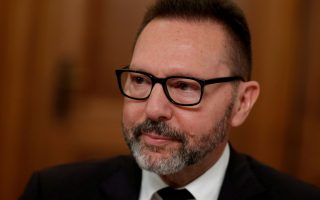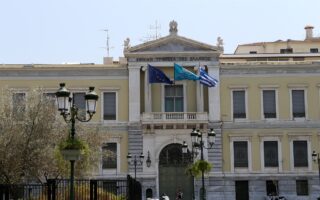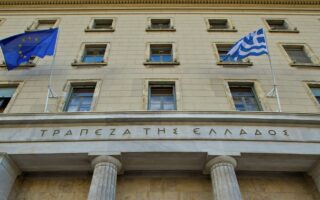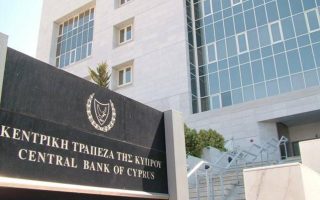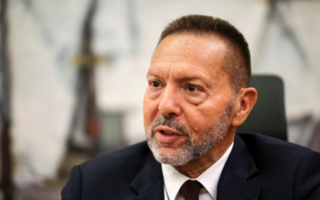The EU needs ‘financial fuel’ to boost its GDP
The CEOs of UniCredit Group and Alpha Bank, Andrea Orcel and Vassilios Psaltis, discuss what reforms are needed in the bloc’s capital markets

The collaboration between Alpha Bank and UniCredit ensures extroversion and access to better products and services for Greek businesses. This was highlighted in Kathimerini’s joint interview with the heads of the two groups, Alpha’s Vassilios Psaltis and UniCredit’s Andrea Orcel, who explained the benefits of the collaboration in the areas of business banking and wealth management.
Commenting on developments in the European Union, UniCredit’s chief executive observes that “despite the fact that everyone agrees on the need for European convergence, efforts are encountering obstacles.” He warns that stagnation “constitutes a destruction of prospects for people in Europe.”
How do you see Greece from a global point of view?
Andrea Orcel: The Greek recovery since the financial crisis has been incredible! Not only has it made it through difficult times, but it has come out stronger. A few days ago, we were celebrating because Greece was trading through French debt -this is quite a turnaround. In general, I am very positive about Greece: there is a new energy in the economy, with inflation declining, the labor market remaining strong, and fiscal performance is improving. In the first half of 2024, the Greek economy grew by 2.2%. Since the crisis, I think Greece has suffered from misperception by many, but as time passes and the economy continues to grow, this sentiment will dissolve.
UniCredit is the only strategic investor that participated in the government’s privatization program for Greek banks. Why Greece and why Alpha Bank?
Andrea Orcel: I personally have always had a very good relationship with Greece and, as I mentioned, its recovery since the financial crisis has been incredible. So, I’m delighted we could partner in this way. This partnership is strong because of UniCredit’s unique model, the alignment between our two organizations, and between the vision Vassilios and I share. We know each other for 20 years and we spent time discussing this partnership and the right approach. We knew that UniCredit’s offer could create enormous value for Greek corporates and consumers that Alpha could provide us with access to. UniCredit Group is a federation of 13 banks, and we have to make sure that every market is being served in the best way, while leveraging the strength of being a pan-European organization. This model is beneficial for clients in Greece because it means they can access the very best products and services, which can only be provided thanks to our scale and the partnerships we’ve built.
Vassilios Psaltis: Our strategic partnership with UniCredit represents a unique opportunity for the Greek economy and for Alpha Bank. As the trusted relationship bank of Greece, our customers include many Greek companies, of all sizes, that operate in the countries where UniCredit is present. So, this aspect of our cooperation is at the heart of what we are trying to achieve in Europe: Greek companies on the southeastern border of Europe are connected to the heart of the European Union. So, we are opening up the bank in a way that would not have been possible otherwise. I believe that the model we had in the 2000s, investing in the Balkans, is very different from the ambition that Greek companies have today. Today’s approach is a B2B model, which extends not only to the Balkans, but to the heart of Europe. And that is where we can offer something new, and everyone who sees the opportunity of such an integrated banking offering is excited. In fact, Andrea had the opportunity to hear from our own customers how they feel about it.
Andrea Orcel: We met with corporate clients in Athens and were able to understand their challenges. A significant portion of the Greek industry is active abroad: they might have a reference bank in Greece, but they’ll need other banks in the countries they are expanding into. Those other banking relationships tend to be quite transactional. This is also true for some Italian companies, in gas for example, that have made investments in Greece and have significant operations in the country. They might work closely with UniCredit in Italy, but just have a correspondent bank in Greece who they have a transactional relationship with. Our partnership with Alpha Bank and the alignment of our operations will enable us to serve these clients better, providing them with a ‘single point of entry’, while addressing any challenges more swiftly.
You met in Athens, along with a large team of executives, from both sides.
Vassilios Psaltis: I am particularly pleased that our shared strategic vision has been translated into concrete collaboration across a wide range of initiatives. All this has been possible because our two teams have wholeheartedly embraced this evolving vision, making it their own and uncovering opportunities to work together that were not apparent a year ago. There are around 30 dedicated working groups that we have set up to capture end-to-end commercial opportunities. For example, we have a team working on Romania. We will have the regulatory approvals in time to complete the cross-shareholdings by the end of the year, as UniCredit will acquire 90% of our subsidiary and we will acquire 10% of theirs. This means that we can proceed with the legal and operational merger next year. That is one stream. The other stream relates to another transaction that we have pending, which is in the bancassurance area. We will be moving into the execution phase next year. In addition, there are several commercial initiatives that we have identified to work together. The first of these has already come to fruition with the launch of the onemarkets family.
Andrea Orcel: We wanted to bring our teams together and work towards our mutual goals. We are energized in what we want people to do, and we felt that this time we needed to be in Athens. I think people are really enjoying it. What is getting the partnership to really work well is to go beyond the relationship that Vassilios and I have, into a relationship that works seamlessly at all levels where our people do things not because we tell them, but because they like each other, and they can connect with each other. With days like this, we reinforce that message, and I think it’s working very well.
From your shareholdings map, we can conclude that your strategy is to maintain majority stakes in all your subsidiaries. Do you intend to increase your stake in Alpha Bank?
Andrea Orcel: Vassilis and I are very happy with the way we structured this partnership and how it is working. It is testing a different part of our model, i.e. our ability to create linkages in countries where we are not directly present. We provide and leverage our factories, our products, our services, and the connectivity with the other European countries. We are very happy with that as we said on day one. In a sense, this partnership is a new concept, but one that works very well. When we started this collaboration, we prepared a business plan on what we expected from it. We had a base case and a best case. Today, 10 months into that, we have progressed more than 3 times what our best case planned for, showing that it is really is working for both sides.
So, what is the role of Alpha Bank in UniCredit’s European network? How do you see it?
Andrea Orcel: I would position Greece as an additional country in our European banking network, reached via a partnership rather than ownership. Our clients and Alpha Bank’s clients will reap the benefits of connecting to the 13, now 14 countries we have in our network. UniCredit and Alpha Bank are going to create value through the flow exchange between countries, by being able to offer our products, by their client being able to buy our products. So, it is a very different type of association vis-à-vis one that we would have with a bank that we own.
Is UniCredit going to have a member in the board of Alpha Bank?
Andrea Orcel: Yes, we are. I think it’s important to realize that the stake we took was to underscore the partnership. It was not for the stake per se. So, we will have a member of the UniCredit team. Alpha wanted somebody, who could push in certain areas and contribute some of our experience. I think we chose together a person who can help, who can be additive in terms of values and expertise in all the things we are doing together.
In Greece, the sector of wealth management is significantly below EU peers and the proportion of GDP is about 10% versus 35% or 45% maybe in Europe. What must be done to change this situation?
Vassilios Psaltis: Firstly, we need to understand that the deposit product is not really the way to create or increase wealth. Its purpose is to meet our daily needs and to help us deal with more short-term liquidity issues. But if you are to plan over your life cycle for a pension nest, it requires preparation, a lot of discipline and options, which a term deposit can’t provide. This is very important because in Greece, still remembering what happened during the crisis when interest rates skyrocketed, most of our fellow citizens still see a deposit as the only option. Secondly, in Greece, we do have an uphill struggle as far as our pension system is concerned. The demographics are such that we are almost certain to face significant issues in the future. Therefore, the second pillar, the occupational pension funds, together with the third pillar, the individual – voluntary contributions – should be activated to co-create a safe environment for workers concerning their retirement. And thirdly, Greeks are still opting for illiquid assets, namely real estate. This is the reason for the high rate of home ownership, but at the same time it is the reason why we have so many closed properties that do not contribute to the household income.
The demographics are such that, with the significant decline in the birth rate, wealth has been concentrated in fewer and fewer hands through inheritance over the last 20 years. Banks have a duty towards their clients to help them embrace a new investment culture if they want to use the capital and means available to them to allocate their assets, and at the same time to inform them that there are good products on the market, not of the “I’m going to buy this share or that bond” type, but products that offer risk diversification in line with each person’s profile. This is where our UniCredit onemarkets fund project comes in.
There was an internal launch…
Vassilios Psaltis: Yes, we made the presentation to our network executives and the reception was enthusiastic, especially about the potential of these new products. onemarkets is the brand UniCredit is using to provide tailored solutions for different types of investors in the investment fund space. It is a unique concept that takes best-in-class products from Fidelity, PIMCO, Capital Group and other providers and targets a broad range of investors. As an indication of the momentum of the new investment solutions, in the last three months of offering onemarkets as a pilot project to selected clients, we have already raised approximately €100 million. Onemarkets is structured in such a way that it is not only suitable for private banking or affluent clients, but for all our clients. Given that we are the market leader, through Alpha Asset Management, by adding another strong brand like onemarkets, we offer investors a window to the world.
What is your view on the very low interest rates for the deposits here in Greece. Italian banks offer almost double interest rates. What accounts for this difference?
Andrea Orcel: I would go back to what Vassilios said; First of all, Greece is very liquid at the moment. If you look at the loan-to-deposit ratio of Greece, it is 60%, Italy is at 90% and the Eurozone is at 100%. What this tells you is that there is a lot more cash being deposited with Greek banks than they can use for loans. Just because of supply and demand, that has, by definition, an implication on pricing. Part of the reason, in my opinion, as to why this is the case, is because Greeks have put their savings in deposits and not in something else. If I take, for example, the Italian experience, Italians do not expect to have their savings rewarded through a current account or a term deposit. They will either buy Italian government bonds, because they are relatively high yielding, or asset management products. Therefore, in Italy, the part of savings that is in deposits is rewarded more, as it is more balanced compared to the needs of the banks.
Vassilios Psaltis: This trend of shifting deposits has also been observed in Greece, where 6.5 billion euros have been invested in mutual funds and a further 4.5 billion in treasury bills in recent months. As a result, EUR 11 billion has been channeled into investment opportunities rather than the traditional route of time deposits.
Yes, this was a big change.
Vassilios Psaltis: Yes, and there are two other reasons why behavior is changing. On the one hand, deposit balances are lower because households’ budgets have become “tighter” as a result of the crisis and do not have the same amount of money available. On the other hand, digitalization and the applications offered allow our customers to better manage the income available for transactions and the part that can be used for investments.
Andrea, everybody calls you sort of a Jamie Dimon of Europe. Jamie is Greek, which is a big difference, but other than that, how do you feel about that?
Andrea Orcel: I don’t feel like that. I do think, however, that there is more and more a debate on Europe’s need for stronger banks and there needs to be a vision for European banking. And because of the very texture of UniCredit by being, let’s say, so pan-European vis-à-vis anybody else, it is a role that is usually associated with us, not because we are better or worse, but just because we are different. I think the EU needs to converge, and I think we always hear that everybody agrees with that. But when you go and try and do it, there are obstacles in every industry. If we didn’t find a common denominator, the Group would struggle because everybody was pulling in a different direction. All the potential advantage we had were not used, and then there was no reason why we should be together. This is the reason why we went from where we were, to where we are today. I do think that the European Union needs something like that. At UniCredit, we landed on the vision for the group to be the bank for Europe. Everybody is really motivated by that concept, by that purpose, and to do it in a way that would be a benchmark for everybody else. Therefore, we are constantly faced with the need for the banking union, banking convergence. Everybody agrees on this, but the problem is we have not been able to deliver yet.
Your compatriot Mario Draghi has issued his report. Everybody says this is the last wake-up call for Europe in terms of the need for a capital markets union and more investment and so on. But my sense is that nobody is really listening to this, right?
Andrea Orcel: What Mario Draghi, and others before him, are saying, is “look at it.” Just 15 years ago, the European Union and the United States had the same GDP. Identical! Since then, the US grew by 80% but the EU remained stationary, even though our population has significantly increased through accession. In my view, this stagnation is a destruction of value, opportunity and prospects for all the people of Europe. And if we wait years to take action it will continue to worsen until it is unrecoverable. We do not have a capital markets union; we have banks that are fragmented. No European bank is in the top 25 globally. So, the banking system may struggle to fund these plans. Governments are an option, but all their balance sheets are stretched. Therefore, financial fuel is needed – and this is with banks and capital markets. Banks are not always better than capital markets, but they are a lot faster. In order to bring about the capital markets union, significant reform is needed in pension and institutional funds and more. We must do these reforms but they’re not immediate, whereas the banking sector stands ready. Some people say that “banks should take risks, but they don’t.” Well, if we can have broader shoulders because we’re diversified, we can take more measured risks.
We live in an age of turbulence, geopolitical risks and so on. Is this something that keeps you up at night?
Andrea Orcel: The environment in which we operate has totally changed. We moved from a lengthy bull market into the financial crisis. And then we had more than a decade of negative rates and volatility. Now, we don’t know from where, but we’re going to have some more shocks. Nobody expected inflation to rise as it did, for example. In my opinion, governments and companies need to be more agile in adapting. Budgets and plans must be ready to change at shorter notice. What keeps me up at night is that before, we used to be very global in our outlook. Now, we are increasingly fragmented, shocks tend to occur more often, and we need to be more and more vigilant, anticipate and adapt quickly.
